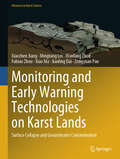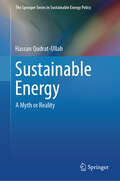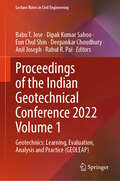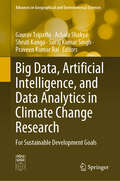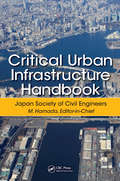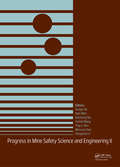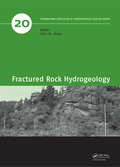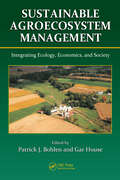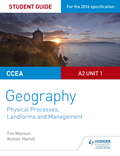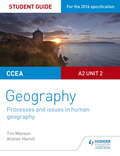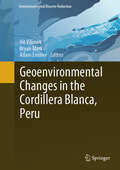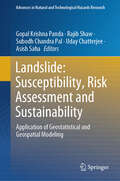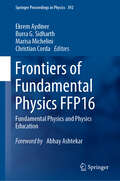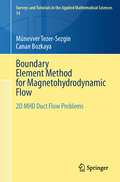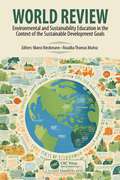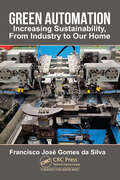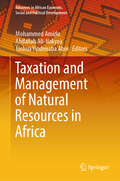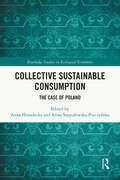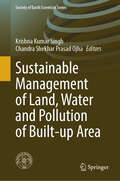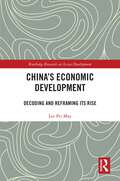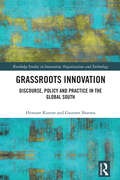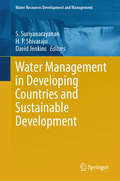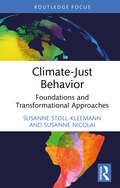- Table View
- List View
Monitoring and Early Warning Technologies on Karst Lands: Surface Collapse and Groundwater Contamination (Advances in Karst Science)
by Wanfang Zhou Mingtang Lei Xiaozhen Jiang Jianling Dai Xiao Ma Fubiao Zhou Zongyuan PanThis book compiles a broad range of monitoring and early warning technologies focused on high-resolution in-situ water quality parameters at springs and monitoring wells. The surface collapses often cause severe damage to infrastructures, properties, and loss of lives, whereas contaminated groundwater poses risks to human health and the environment. Collapses are critical in karst systems, sparsing a seventh of Earth’s land surface. Karsts are also very relevant for drinking water, yet karst represents a fourth of global drinking water. Mitigating collapses and contaminated groundwater in karst aquifers can be complicated and costly. These parameters detect hydrodynamics, internal soil erosion, and ground deformation changes as karst collapse and pollution proxies. This book represents the most comprehensive overview of decades of research on karst collapse and groundwater contamination. This book is of interest to researchers and policymakers.
Sustainable Energy: A Myth or Reality (The Springer Series in Sustainable Energy Policy)
by Hassan Qudrat-UllahThis book embarks on a transformative journey through the complex landscape of renewable energy, challenging prevailing myths and uncovering the realities that define our energy future. At the heart of this exploration lies the dynamic intersection of technology and sustainability, spotlighting the critical nexus where innovation meets eco-conscious solutions. Far from a mere debunking exercise, this book unfolds as a comprehensive narrative, weaving through the complex tapestry of challenges and opportunities that define the sustainable energy paradigm. Unravelling misconceptions surrounding sustainable energy, the book places a particular emphasis on renewable sources like solar and wind, providing a profound understanding that extends beyond the surface. Engaging case studies and examples punctuate the narrative, offering a firsthand glimpse into the practical applications and challenges of sustainable energy projects. Designed for a diverse readership, the book speaks to: (i) Students and teachers: Delving into the scientific and technical intricacies of sustainable energy sources, along with their broader environmental, social, and economic impacts. (ii) Researchers and professionals: Offering an up-to-the-minute guide to the latest developments and trends in the ever-evolving field of sustainable energy. (iii) Policy makers and activists: Providing a nuanced exploration of the facts and evidence underpinning sustainable energy, alongside an insightful examination of the myths and misconceptions that surround it. (iv) General readers: Inviting all who seek to broaden their knowledge and awareness of sustainable energy, understanding its profound relevance and importance for the collective future of humanity and the planet. This book isn't just a journey; it's a call to action. As you turn the pages, you're not only gaining knowledge but becoming part of a movement toward a resilient and eco-friendly tomorrow. Embrace the future of energy – informed, inspired, and empowered.
Proceedings of the Indian Geotechnical Conference 2022 Volume 1: Geotechnics: Learning, Evaluation, Analysis and Practice (GEOLEAP) (Lecture Notes in Civil Engineering #476)
by Deepankar Choudhury Anil Joseph Babu T. Jose Dipak Kumar Sahoo Eun Chul Shin Rahul R. PaiThis book comprises the select proceedings of the Indian Geotechnical Conference (IGC) 2022. The contents focus on recent developments in geotechnical engineering for a sustainable world. The book covers behaviour of soils and soil–structure interaction, soil stabilization, ground improvement and land reclamation, shallow and deep foundations, geotechnical, geological and geophysical investigation, rock engineering, tunnelling and underground structures, slope stability, landslides and liquefaction, earth retaining structures and deep excavations, geosynthetics engineering, geo-environmental engineering, sustainable geotechnics and landfill design, geo-hydrology, dam and embankment engineering, earthquake geotechnical engineering, transportation geotechnics, forensic geotechnical engineering and retrofitting of geotechnical structures, offshore geotechnics, marine geology and sub-sea site investigation, computational, analytical and numerical modelling, reliability in geotechnicalengineering. The contents of this book are useful to researchers and professionals alike.
Big Data, Artificial Intelligence, and Data Analytics in Climate Change Research: For Sustainable Development Goals (Advances in Geographical and Environmental Sciences)
by Praveen Kumar Rai Shruti Kanga Suraj Kumar Singh Gaurav Tripathi Achala ShakyaThis book explores the potential of big data, artificial intelligence (AI), and data analytics to address climate change and achieve the Sustainable Development Goals (SDGs). Furthermore, the book covers a wide range of related topics, including climate change data sources, big data analytics techniques, remote sensing, renewable energy, open data, public–private partnerships, ethical and legal issues, and case studies of successful applications. The book also discusses the challenges and opportunities presented by these technologies and provides insights into future research directions.In order to address climate change and achieve the SDGs, it is crucial to understand the complex interplay between climate and environmental factors. The use of big data, AI, and data analytics can play a vital role in this effort by providing the means to collect, process, and analyze vast amounts of environmental data. This book is an essential resource for researchers, policymakers, and practitioners interested in leveraging these technologies to tackle the pressing challenge of climate change and achieve the SDGs.
Nordic Approaches to Climate-Related Human Mobility (Routledge Studies in Environmental Migration, Displacement and Resettlement)
by Miriam CullenAcademic discussion of climate‑related human mobility has understandably focused on the places where people are especially vulnerable to climate‑related harm: the Global South. Yet, the unique biophysical, legal and socio‑political characteristics of the Nordic region, as well as its roles as both ‘home’ and ‘host’ to climate‑related mobilities, justify its independent attention. Filling this lacuna, this collection is the first to address climate‑related human mobility in the Nordic region. It is a timely and much needed collection, which brings together leading and emerging voices from both academia and practice in a single volume, spanning policy and geographical breadth. Its chapters cover both regional approaches to the global phenomenon of climate mobility, such as the traditional role of the Nordic states as norm entrepreneurs and their representation in multilateral fora, and on‑the‑ground climate impacts unique to this region and their localised responses. Case studies include judicial decision‑making as it relates to climate‑related migration, insights into the local communication of climate risk, changes to Nordic development and climate policy, as well as climate‑related mobilities of Nordic Indigenous Peoples.This volume will be of great interest to students and scholars of disaster and climate studies, as well as climate‑related mobility, migration and displacement.
Critical Urban Infrastructure Handbook
by M. HamadaA reference for engineers and facilities professionals involved in the planning, operations, management, and maintenance of all urban utilities, this handbook addresses water supply and sewerage, power, gas, telecommunications joint utility corridor (utilidor) lifeline facilities, and other critical civil infrastructure lifelines. It covers the design and construction of facilities, maintenance, disaster management, environmental protection, and disaster and emergency recovery measures. It also discusses urban planning, life cycle cost, GIS analysis of lifeline systems, computerized integrated management systems, and the use of new materials and technologies.
Progress in Mine Safety Science and Engineering II
by Xueqiu He Wenxue Chen Xiangchun Li Hani Mitri Baisheng Nie Yunhai Wang Ting X RenProgress in Mine Safety Science and Engineering II discusses mine safety techniques and technologies, methods and approaches, as well as problems and issues, and will be of invaluable to academics and engineers interested or involved in mine safety issues.
Fractured Rock Hydrogeology (ISSN)
by John M. SharpUnderstanding of groundwater flow and solute transport in fractured rocks is vital for analysis of water resources, water quality and environmental protection, geotechnical and engineering projects, and geothermal energy production. This book includes theoretical and practical analyses using numerical modelling, geochemistry, isotopes, aquifer tests, laboratory tests, field mapping, geophysics, geological analyses, and some unique combinations of these types of investigation. Current water resource and geotechnical problems and the techniques now used are also discussed. Aimed at practicing hydrogeologists, engineers, ecologists, resource managers, students and earth scientists.
Sustainable Agroecosystem Management: Integrating Ecology, Economics, and Society
by Patrick J. Bohlen Gar HouseSustainable Agroecosystem Management: Integrating Ecology, Economics, and Society examines the challenges for developing integrated approaches to the management of agricultural ecosystems. Providing historical background of attempts to bridge the ecological and agricultural sciences, this book highlights recent efforts to integrate natural and social science perspectives. Through various case studies with global applications, the text explores practical innovative strategies, policies, and research needs for emphasizing whole system productivity, diversification of agricultural operations, and management of agricultural systems that sustain multiple functions including ecological integrity.
CCEA A2 Unit 1 Geography Student Guide 4: Physical Processes, Landforms and Management
by Tim Manson Alistair HamillExam Board: CCEALevel: A-levelSubject: GeographyFirst Teaching: September 2016First Exam: June 2018Reinforce students' geographical understanding throughout their course; clear topic summaries with sample questions and answers help students improve their exam technique and achieve their best.Written by teachers with extensive examining experience, this guide:- Helps students identify what they need to know with a concise summary of the topics examined at AS and A-level- Consolidates understanding through assessment tips and knowledge-check questions- Offers opportunities for students to improve their exam technique by consulting sample graded answers to exam-style questions- Develops independent learning and research skills- Provides the content students need to produce their own revision notes
CCEA A2 Unit 2 Geography Student Guide 5: Processes and issues in human geography
by Tim MansonExam Board: CCEALevel: A-levelSubject: GeographyFirst Teaching: September 2016First Exam: June 2018Reinforce students' geographical understanding throughout their course; clear topic summaries with sample questions and answers help students improve their exam technique and achieve their best.Written by a teacher with extensive examining experience, this guide:- Helps students identify what they need to know with a concise summary of the topics examined at AS and A-level- Consolidates understanding through assessment tips and knowledge-check questions- Offers opportunities for students to improve their exam technique by consulting sample graded answers to exam-style questions- Develops independent learning and research skills- Provides the content students need to produce their own revision notes
Geoenvironmental Changes in the Cordillera Blanca, Peru (Geoenvironmental Disaster Reduction)
by Vít Vilímek Bryan Mark Adam EmmerThis book focuses on Peru’s highest and most glacierized mountain range – the Cordillera Blanca. This mountain range experienced numerous disasters in the past (e.g. lake Palcacocha outburst in 1941, earthquake-induced ice and rock avalanche from Mt. Huascarán in 1970) and attracted the attention of researchers from around the world.The 15 chapters of the book span from broadly thematic topics of geology, geomorphology, climate, hydrology and hydrogeology, lakes, glaciation, and environmental settings to more specific topics and emergent themes of relevance for the Cordillera Blanca, including studies of various types of natural hazards (landslides, GLOFs). While most of the chapters focus on biophysical processes of the natural environment, several chapters explore the complex interactions between humans and environmental factors, providing insights and perspectives from social science and the humanities. This book is unprecedently comprehensive overview of the state-of-the-art knowledge about the geo-environmental changes in the Cordillera Blanca.
Landslide: Application of Geostatistical and Geospatial Modeling (Advances in Natural and Technological Hazards Research #52)
by Rajib Shaw Uday Chatterjee Subodh Chandra Pal Gopal Krishna Panda Asish SahaThe book illustrates a geospatial and geostatistical approach to data analysis, modeling, risk assessment, and visualization, as well as landslide hazard management in the hilly region. This book investigates cutting-edge methodologies based on open source software and R statistical programming and modeling in current decision-making procedures, with a particular emphasis on recent advances in data mining techniques and robust modeling in torrential rainfall and earthquake induced landslide hazard.
Frontiers of Fundamental Physics FFP16: Fundamental Physics and Physics Education (Springer Proceedings in Physics #392)
by Burra G. Sidharth Marisa Michelini Ekrem Aydiner Christian CordaThis book is a collection of contributions presented at the 16th annual international symposium “Frontiers of Fundamental Physics” (FFP16), supported by Istanbul University. As a document of the latest occurrence of this very important gathering, it presents the most recent advances in fundamental physics and physics teaching. For nearly fifteen years, the FFP has attracted some of the greatest physicists in the world. The broad objective of the entire endeavor has been to enable scholars working in slightly different areas to meet on a single platform. Even with this particular year’s safety restrictions arising from Covid, we feel that the general mission has been carried out as fully as in any year. The book features addresses given by a host of expert contributors, all of which are organized according to seven individual themes. The areas covered include Astronomy and Astrophysics, Particle Physics, Theoretical Physics, Gravitation and Cosmology, Computational Physics, Condensed Matter Physics, Complex Systems and related areas. This book should prove to be a veritable bounty for anyone with an interest in the continued evolution of our understanding of the physical world.
Boundary Element Method for Magnetohydrodynamic Flow: 2D MHD Duct Flow Problems (Surveys and Tutorials in the Applied Mathematical Sciences #14)
by Münevver Tezer-Sezgin Canan BozkayaBoundary Element Method for Magnetohydrodynamic Flow” offers one of the first systematic and detailed treatments of the application of boundary element method (BEM) to magnetohydrodynamic (MHD) flow problems. It aims to fill in the gaps left by the earlier books on the application of BEM to some physical problems such as fluid dynamics, elasticity, and geophysics. An overview of the theory of MHD flow and a comprehensive mathematical formulation of BEM for convection-diffusion-type differential equations are provided by the authors, who heavily rely on their research and experience in the disciplines of BEM and MHD flow. The book first discusses the basic principles of the BEM approach for the MHD duct flow problems in coupled form with the fundamental solution derived by the authors. Specifically, the BEM solutions of MHD flow in pipes of rectangular or circular cross-sections, and MHD flow in infinite regions, are all covered emphasizing the convergence of infinite boundary integrals. This book, especially, concentrates on the MHD flow in regions with partly insulated partly perfectly conducting boundaries by BEM giving also the parabolic boundary layer thickness emanating from the points of discontinuities on the walls. The book secondly includes the dual reciprocity boundary element technique (DRBEM), an alternative form of BEM that expands the applicability of BEM to MHD flow and heat transfer problems as well as buoyancy MHD flow with magnetic potential and inductionless MHD flow. The purpose of the book is to serve as a research book for applied mathematicians, engineers, scientists, and graduate students who wish to learn in-depth about the formulation and application of BEM in MHD flow problems. As such, it is an invaluable resource and a major contribution to the numerical solution of MHD flow problems.
World Review: Environmental and Sustainability Education in the Context of the Sustainable Development Goals
by Marco Rieckmann Rosalba Thomas MuñozThe global landscape of education has been reshaped by the COVID-19 pandemic, revealing the various challenges faced by countries worldwide. This book provides a comprehensive exploration of Environmental and Sustainability Education (ESE) across different countries, offering unique insights into their histories, challenges, achievements, and future ESE needs. From Africa to Oceania, the book delves into the vital role of ESE in the context of the UN Sustainable Development Goals. It highlights the diverse national discourses and the flexibility required to deliver effective global education programs. ESE practitioners, researchers, and policymakers worldwide will find inspiration and invaluable perspectives in this book.
Green Automation: Increasing Sustainability, From Industry to Our Home
by Francisco José Gomes da SilvaEnvironmental issues are a growing concern for our society, and should deserve increased attention, given the extremely negative climate changes which have been taking place. Emissions of greenhouse gases, excessive dependence on fossil fuels, growing consumption of power energy, and exacerbated consumption of materials are some of the problems that need to be addressed urgently. Some of these problems can be overcome through ingenious solutions based on automation. This book aims to make a contribution precisely in this sense, criticizing the current state of society in general and providing some solutions that can be used as a basis for the development of more environmentally friendly systems.
Taxation and Management of Natural Resources in Africa (Advances in African Economic, Social and Political Development)
by Joshua Yindenaba Abor Mohammed Amidu Abdallah Ali-NakyeaThis book offers a comprehensive examination of the fundamental concepts and principles crucial to the taxation and management of natural resources, specifically tailored to the unique challenges faced by developing African countries. It delves into the key instruments that comprise a resource tax policy, providing invaluable insights into the tax reforms necessary to maximize economic rent for African nations. Written by experts in the field, this book explores the potential application of effective revenue management principles by African governments to achieve desired developmental outcomes. It covers a wide range of topics, including socio-political risks, ethical dilemmas, accountability and transparency, resource rent and capital gains taxes, tax administration and reforms, taxation of oil and gas revenue, environmental taxation, globalization's impact, and the promotion of inclusive development. Designed for scholars, tax professionals, and individuals interested in natural resources management and revenue mobilization strategy in Africa, this book bridges the gap between theory and practice, providing valuable insights and recommendations for sustainable and responsible management of Africa's rich natural resources.
Collective Sustainable Consumption: The Case of Poland (ISSN)
by Anna Horodecka Alina Szypulewska-PorczyńskaIn the face of climate change and resulting environmental and social crises, sustainable consumption has become a widely discussed issue and a key plank of the UN’s Sustainable Development Goals (SDGs). The majority of the sustainable consumption research uses the SDG framework, but this only serves to reinforce an individualistic, efficiency-based approach and it does not sufficiently cover the specific situation of transition economies. In contrast, this volume promotes a collective approach to sustainable consumption, and combines general theoretical issues with empirical examples from the Polish economy. The first part of the book presents a theoretical approach to collective consumption which has the core concepts of justice and human nature at its heart. This approach emphasises the role of collective rationality and categorises aspects of sustainable consumption as a common and public good. The second part investigates diversified aspects of sustainability, including socio-economic inequalities as barriers to sustainable consumption, consumer sovereignty in the context of current legal regulations, and the impact on employees of changes to the types and conditions of work. It also examines the sharing economy and the legal conditions of its development. The third part adopts a political perspective focusing on the state policies enhancing the role of investment in public goods, analyses photovoltaic programmes which promote prosumption and indicates challenges to sustainability faced by many countries such as the energy crisis, sustainable finance, and cooperative platforms.This book will be of great interest to researchers and scholars interested in sustainability and consumption issues in economics, management, law, public administration, and political science.
Sustainable Management of Land, Water and Pollution of Built-up Area (Society of Earth Scientists Series)
by Chandra Shekhar Prasad Ojha Krishna Kumar SinghThis edited book is a comprehensive and forward-thinking exploration of the challenges and opportunities in building environmentally resilient and thriving cities. In a rapidly urbanizing world, the management of land, water, and pollution within built-up areas is a critical issue, and this book presents a wealth of knowledge to address it. It showcases a range of case studies and real-world applications that illustrate successful strategies and innovative solutions for urban sustainability. These practical examples offer valuable insights for urban planners, policymakers, and environmental practitioners.The book delves into cutting-edge research and visionary solutions. It goes beyond conventional approaches to explore emerging technologies and futuristic concepts, positioning itself at the forefront of urban sustainability. Readers will discover innovative ideas that can shape the future of urban development, making cities more livable, sustainable, and resilient.
China's Economic Development: Decoding and Reframing its Rise (Routledge Research on Asian Development)
by Lee Pei MayThrough a rigorous examination of “China’s rise”, Lee addresses an important question—Did China catch up? Or more specifically, can growth be automatically translated to catching up with the advanced industrialised countries or has it only allowed limited progress (if any) to be made?To answer these queries and the broader question of the possibility of the Global South converging with the Global North, four development theories are utilised, with competing explanations, to uncover the complexity and multifaceted development of China. This includes whether China really has a unique developmental model to offer. Positioning China within the global economy, this book traces its developmental progress over time as well as its progress relative to other countries. To understand whether the Chinese political economy is socialist (or not), Lee moves away from the orthodox definition of socialism and instead examines the official narrative of Socialism with Chinese Characteristics. Lastly, this book argues that though China is catching up, challenges that could potentially block China’s progress for a full catch‑up are to be anticipated.A useful resource for students and scholars in the fields of international relations, international political economy, Chinese studies, and development studies.
Grassroots Innovation: Discourse, Policy and Practice in the Global South (Routledge Studies in Innovation, Organizations and Technology)
by Gautam Sharma Hemant KumarThis book explores the process of grassroots innovation in the context of the Global South. It explains why these bottom-up solutions developed by common people are generated due to a lack of available or affordable technology to meet their needs and how they are included in the mainstream imagination of the economy by studying these innovations in India. It analyses the grassroots innovation process from idea generation to its implementation.Detailing both theoretical and practical dimensions of grassroots innovation, the book provides a holistic understanding of the phenomenon by tracing its history in the pre-independence discourse on development to the present-day policies for institutionalizing these innovations in the mainstream. It will provide the readers with a bottom-up commentary on innovation and development in the context of the Global South in general and India in particular. It adopts a qualitative research design with a wide range of data collected through interviews, participant observations, and field notes. The book contains seven chapters to describe the discourse, policy perspectives, and current practice of grassroots innovations in general.The interdisciplinary, timely book provides thoughtful analysis for scholars and upper-level students in the fields of technology and innovation management, development studies, and public management.
Water Management in Developing Countries and Sustainable Development (Water Resources Development and Management)
by David Jenkins S. Suriyanarayanan H. P. ShivarajuThis book provides information on sustainable water resource management strategies that present innovative ways to conserve both quality and quantity of water in developing countries. The book comprises of 24 chapters contributed by authors from 14 countries, namely, Cameroon, China, Cyprus, India, Indonesia, Italy, Namibia, the Netherlands, Norway, Portugal, South Africa, the United Kingdom, the United States of America and Zimbabwe. This book will be of great interest to researchers, practitioners, water resource managers, policy and decision makers, international institutions, governmental and non-governmental organizations, educators, as well as students.
Sustainable Business in the Era of Digital Transformation: Strategic and Entrepreneurial Perspectives (ISSN)
by Vesna Zabkar Marek Ćwiklicki Mariusz Sołtysik Magdalena Wojnarowska Maria Urbaniec Erica VareseSustainable development is a complex issue and despite many studies and publications in recent years, it remains poorly recognised on best practices in core business areas. Achieving the Sustainable Development Goals in accordance with the 2030 Agenda for Sustainable Development depends on research and innovation. Therefore, the transition to sustainable development requires investment in technology, new business models, and social and environmental innovations that contribute to shaping new business and promoting sustainable business practices.This book seeks to understand how sustainability affects core business areas, with a focus on strategic and entrepreneurial activities. Given these considerations, the main purpose of this book is twofold: (1) to contribute to a better understanding of important and current trends in the field of sustainable transformation in core business areas; and (2) to provide a comprehensive overview of quantitative and qualitative studies in the field. The book ultimately seeks to shed light on how companies are implementing sustainable transformation in the core areas of product and marketing, entrepreneurship, and innovation, which is supported by appropriate project management strategies.The book provides researchers and upper-level students in economics, business, and other social sciences with an overview of interdisciplinary theoretical and conceptual perspectives and frameworks for successful business transformation. It will be of particular value to those researching sustainable development and strategic management.
Climate-Just Behavior: Foundations and Transformational Approaches (Routledge Focus on Environment and Sustainability)
by Susanne Stoll-Kleemann Susanne NicolaiThis book highlights the obstacles to and potential for a just transformation as a way out of the current climate crisis.This volume examines the barriers, opportunities and incentives around the pursuit of climate-just behavior, based on a comprehensive interdisciplinary and integrative analysis. It investigates how the gap between expressing concern about the climate crisis and giving it a high priority within the context of everyday behavior can be overcome. At the same time, it looks at the challenging politico-economic framework conditions such as the strong economic growth and profit orientation of capitalism. Although justice is a fundamental human motive, which should induce climate-just behavior, system justification is common and makes people rather justify their unjust behavior. In this book, a general and systemic framework on human behavior is provided, including internal factors, such as knowledge and psychological needs, external factors, such as socio-cultural and politico-economic factors, feedback loops and interactions. The authors draw on multiple theories to examine how denial and moral disengagement affect individual responsibility, despite real-world evidence of the climate crisis. The book highlights the role of emotions in encouraging a pro-environmental response and discusses solutions on both the individual and the collective level, such as transparency laws. Moreover, making climate-friendly options more accessible, affordable and convenient facilitates behavior change more effectively. Overall, this book presents knowledge-based, realistic approaches to surmounting these obstacles in order to achieve a more climate-just world.Climate-Just Behavior will be of great interest to students and scholars of climate change, climate justice, environmental geography and environmental psychology.
